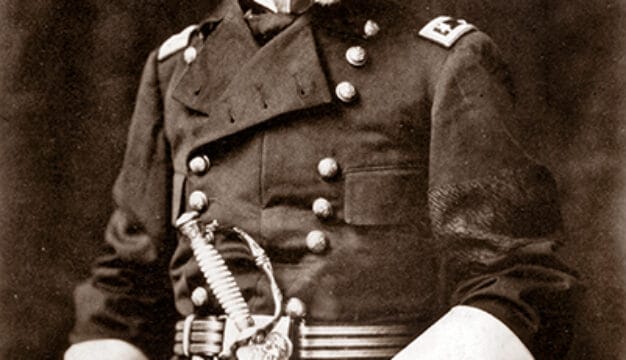Braxton Bragg Comer (1907-11)
 Braxton Bragg Comer
Historians have claimed that the Progressive era in Alabama politics began with the governorship of Braxton Bragg Comer (1848-1927). Scion of a well-to-do family, this successful industrialist and planter spent four stormy years as Alabama’s governor that were marked by progress in education, railroad regulation, tax funding, and conservation. This same person, however, used strong-arm tactics toward labor and demonstrated a lack of genuine concern for children in the labor force. Comer’s brand of progressivism, which sought to serve the new industrial-urban interests while not disturbing the traditions of the old plantation system, brought numerous collisions with powerful interests.
Braxton Bragg Comer
Historians have claimed that the Progressive era in Alabama politics began with the governorship of Braxton Bragg Comer (1848-1927). Scion of a well-to-do family, this successful industrialist and planter spent four stormy years as Alabama’s governor that were marked by progress in education, railroad regulation, tax funding, and conservation. This same person, however, used strong-arm tactics toward labor and demonstrated a lack of genuine concern for children in the labor force. Comer’s brand of progressivism, which sought to serve the new industrial-urban interests while not disturbing the traditions of the old plantation system, brought numerous collisions with powerful interests.
Braxton Bragg Comer was born at Spring Hill, in Barbour County, on November 7, 1848, to John Fletcher Comer and Catherine Drewry Comer, who moved from Virginia to Georgia before finally settling in the southeastern section of Alabama’s Black Belt in the 1840s. John Fletcher Comer was a county judge in Georgia and in Alabama owned a cotton plantation and a lumber mill. He gave his son a good private education, and in 1864 young B. B. Comer entered the University of Alabama, where he remained until forces under the command of U.S. general James H. Wilson burned the school buildings in 1865 during the Civil War. He subsequently attended the University of Georgia and finally received a Bachelor of Arts and a Master of Arts from Virginia’s Emory and Henry College in 1869. Three years later, he married Eva Jane Harris of Cuthbert, Georgia, with whom he would have eight children. The Comers were members of the Methodist Episcopal Church South. Under Comer’s management, the family plantation at Comer Station in Barbour County prospered and grew to more than 30,000 acres.
Like most of his social class, Comer opposed Reconstruction and worked to defeat Republican control of the state government. Democrats won a narrow victory in the pivotal 1874 election, which officially ended Reconstruction in Alabama, and by many accounts, election shenanigans by Comer and his brothers in Barbour County played a major role in that defeat.
Like many postwar planters, Comer branched out into merchandising. In 1885, he used the money he made as a merchant-planter in Barbour County to become a partner in a wholesale grocery business in Anniston, in Calhoun County. He sold his interest in the firm in 1890 and moved to Birmingham, where he became president of the City National Bank and bought cornmeal, flour, and textile mills. Comer achieved his greatest business success in the development of Avondale Mills, a textile venture that grew into one of Alabama’s largest industrial enterprises.
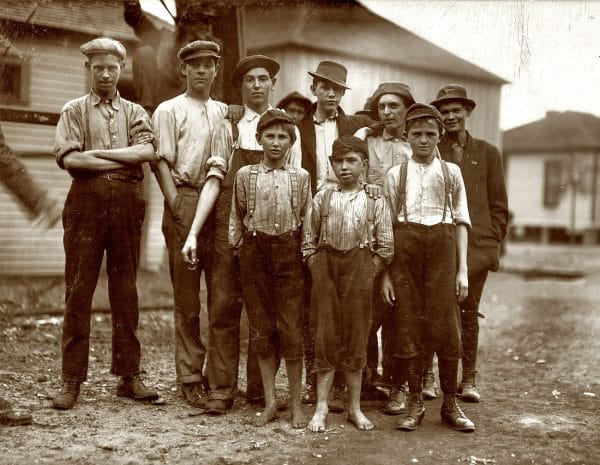 Child Laborers at Avondale Mills, 1910
While in Anniston, Comer learned that his Atlanta competitors could undersell his and other Alabama businesses because of Georgia’s lower freight rates. By the time he had built Avondale Mills, Comer was the state’s most vocal advocate of controlling Alabama’s railroad rate structure. The Birmingham Commercial Club, which Comer helped to organize in 1893, and the Birmingham Freight Bureau, also led by Comer, both investigated freight rate discrimination and recommended that rates be controlled by expanding the powers of the state railroad commission. Comer’s organized efforts failed to persuade legislators of the need for reform during the 1890s, but he and his allies renewed their efforts at the Constitutional Convention of 1901, where they campaigned to include in the document the establishment of an elected railroad commission with extensive powers to regulate rates. When that effort failed, the reformers compromised and accepted a provision in the document that gave the legislature sweeping authority over railroad rates.
Child Laborers at Avondale Mills, 1910
While in Anniston, Comer learned that his Atlanta competitors could undersell his and other Alabama businesses because of Georgia’s lower freight rates. By the time he had built Avondale Mills, Comer was the state’s most vocal advocate of controlling Alabama’s railroad rate structure. The Birmingham Commercial Club, which Comer helped to organize in 1893, and the Birmingham Freight Bureau, also led by Comer, both investigated freight rate discrimination and recommended that rates be controlled by expanding the powers of the state railroad commission. Comer’s organized efforts failed to persuade legislators of the need for reform during the 1890s, but he and his allies renewed their efforts at the Constitutional Convention of 1901, where they campaigned to include in the document the establishment of an elected railroad commission with extensive powers to regulate rates. When that effort failed, the reformers compromised and accepted a provision in the document that gave the legislature sweeping authority over railroad rates.
If the railroads had continued to dominate all branches of government as they did in the 1890s, the new legislative power over railroad rates would have meant little. But efforts to disfranchise African Americans and poor whites and the establishment of a direct primary made it possible for popular forces to challenge entrenched power groups without fear of the manipulation of black votes that often blocked contentious legislation. In 1903, urban reformers failed to get the railroad commission to lower rates. As a result, Comer decided to seek the commission presidency, which the legislature had made elective. He profited from the new primary system and was nominated and then elected to the commission. But Comer found that being president of the commission gave him little power. The two appointed incumbents who held the other commission seats supported the railroads. When they made decisions favoring the railroads in 1905, Comer decided that he had to run for governor to achieve change. Comer knew that he must win not only the Democratic nomination for governor but also control of the legislature. Legislative candidates began to align with or against him.
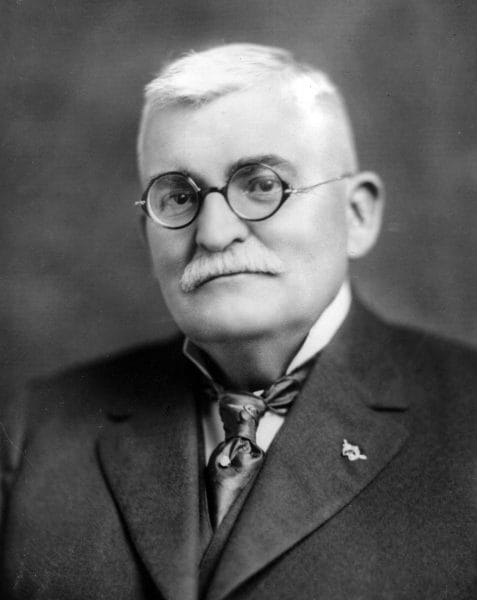 Russell M. Cunningham
The 1906 gubernatorial campaign in the Democratic primary (complicated by the nonbinding selection of candidates to replace Alabama’s two elderly and ill U.S. senators should they die in office before the next legislative session) was one of the most memorable in Alabama’s history. The Democratic Party dropped the word “Conservative” from its formal name, demonstrating that it was now comfortable with a more Progressive platform. The state’s railroads supported Comer’s chief opponent, Lt. Gov. Russell Cunningham, but the line between progressives and conservatives was not clearly drawn. On issues other than railroad rates, Cunningham was as progressive as Comer, who came under severe criticism for his opposition to child labor reform. Comer was a better campaigner and orator than Cunningham, and his verbal attacks on the railroads so aroused Alabama audiences that he won the primary with 61 percent of the vote and the November election with more than 85 percent. A majority of the legislators elected were committed to rate reform, and with this sympathetic legislature to enact and implement his programs, Comer proved to be one of Alabama’s most effective governors.
Russell M. Cunningham
The 1906 gubernatorial campaign in the Democratic primary (complicated by the nonbinding selection of candidates to replace Alabama’s two elderly and ill U.S. senators should they die in office before the next legislative session) was one of the most memorable in Alabama’s history. The Democratic Party dropped the word “Conservative” from its formal name, demonstrating that it was now comfortable with a more Progressive platform. The state’s railroads supported Comer’s chief opponent, Lt. Gov. Russell Cunningham, but the line between progressives and conservatives was not clearly drawn. On issues other than railroad rates, Cunningham was as progressive as Comer, who came under severe criticism for his opposition to child labor reform. Comer was a better campaigner and orator than Cunningham, and his verbal attacks on the railroads so aroused Alabama audiences that he won the primary with 61 percent of the vote and the November election with more than 85 percent. A majority of the legislators elected were committed to rate reform, and with this sympathetic legislature to enact and implement his programs, Comer proved to be one of Alabama’s most effective governors.
The new governor devoted much of his inaugural address to the issue of railroad reform and requested the legislature pass 20 separate laws to give the railroad commission strong rate-making and enforcement powers. His program was enacted with few changes by March 1907. Lawmakers also added a provision that would revoke the state business license of any corporation bringing suit in federal court on any issue already before a state court.
When the railroads did pursue their case in federal courts, a highly publicized legal fight ensued in the federal district court in Montgomery. The case was presided over by former governor Judge Thomas Goode Jones, who had once served as chief legal counsel for the powerful L&N Railroad. Jones sided with the railroads on every decision, and he enjoined the enforcement of several portions of the new Railroad Commission Acts. Efforts to reverse some of his decisions in the higher courts took several years, and it was 1914 before the state of Alabama and the railroads reached a compromise, long after Comer had left the governorship. Comer is credited, nonetheless, with winning the war to give the state increased regulatory power over railroad freight rates.
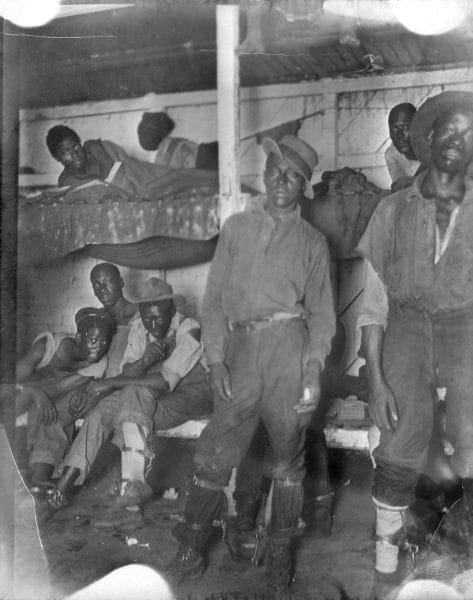 Convicts in Birmingham, 1907
Although B. B. Comer was accused of being a one-issue candidate, he actually supported a broad platform of reforms while governor. His efforts to increase revenue to the state through more accurate assessment of property brought him in conflict with large property owners, including, again, the railroads. He succeeded in creating a state tax commission and a state board of equalization, but despite the rise in the assessed value of property in the state, state tax revenues were less than disbursements in every year of Comer’s administration, requiring the state to rely more heavily on the income it received from the convict-leasing system. Comer and the legislature doubled the general appropriation for public schools and, in a path-breaking measure, mandated a public high school in every county. His administration was generous with its appropriations for higher education, and several of the state’s colleges demonstrated their appreciation by placing his name on new campus buildings. Comer expanded the boys’ reform school system and encouraged humane treatment of Alabama’s convict population. Appropriations to support better public health services increased, and the legislature established a tuberculosis commission and sanitarium. When President Theodore Roosevelt suggested that the nation’s governors should join him in conserving the country’s natural resources, Comer and the legislature established the Alabama Soil Conservation Department to oversee a public park system in Alabama. The legislature passed and the people approved an amendment to the 1901 constitution authorizing the state to help finance public roads. Furthermore, the governor advocated abolition of “bucket shops,” where gambling on stock market prices occurred; supported a local-option liquor bill, which allowed each county to decide for itself whether to have Prohibition; and promoted the expansion of direct primaries.
Convicts in Birmingham, 1907
Although B. B. Comer was accused of being a one-issue candidate, he actually supported a broad platform of reforms while governor. His efforts to increase revenue to the state through more accurate assessment of property brought him in conflict with large property owners, including, again, the railroads. He succeeded in creating a state tax commission and a state board of equalization, but despite the rise in the assessed value of property in the state, state tax revenues were less than disbursements in every year of Comer’s administration, requiring the state to rely more heavily on the income it received from the convict-leasing system. Comer and the legislature doubled the general appropriation for public schools and, in a path-breaking measure, mandated a public high school in every county. His administration was generous with its appropriations for higher education, and several of the state’s colleges demonstrated their appreciation by placing his name on new campus buildings. Comer expanded the boys’ reform school system and encouraged humane treatment of Alabama’s convict population. Appropriations to support better public health services increased, and the legislature established a tuberculosis commission and sanitarium. When President Theodore Roosevelt suggested that the nation’s governors should join him in conserving the country’s natural resources, Comer and the legislature established the Alabama Soil Conservation Department to oversee a public park system in Alabama. The legislature passed and the people approved an amendment to the 1901 constitution authorizing the state to help finance public roads. Furthermore, the governor advocated abolition of “bucket shops,” where gambling on stock market prices occurred; supported a local-option liquor bill, which allowed each county to decide for itself whether to have Prohibition; and promoted the expansion of direct primaries.
Comer’s supporters finally prevailed upon him to support a stronger child labor law, despite his previous history of lobbying against legislation that might either end or severely restrict the use of child labor. Comer employed children in his mills and argued that this practice was not improper because the children worked at their parents’ behest. During the administration of Governor William Jelks, anti-child labor legislation was derailed by Comer and his supporters in favor of a compromise measure that limited children under age 14 from working more than 60 hours a week. Finally, in a half measure, Comer approved legislation that raised the age of night work from 13 to 16 and mandated that children under the age of 16 attend at least eight consecutive weeks of school, making them unavailable for work.
On the issue of liquor control, which divided progressives of the era, Comer shifted his position away from supporting the state’s local-option liquor law. Misreading public sentiment, he reversed his position and ended his term as governor with a crusade for statewide Prohibition. In 1906, the Democratic Party had reacted to the Anti-Saloon League’s advocacy of statewide Prohibition by putting local option into its platform. By 1908, however, 50 of the state’s 67 counties had voted for Prohibition.
The Anti-Saloon League had demonstrated its considerable clout, and Comer cast his lot with them. The state was quickly divided into wet and dry counties, and the Prohibition issue dominated subsequent gubernatorial elections in 1910, 1914, and 1918. It was impossible not to take a stand on the issue, and whatever position Comer took was certain to create enemies. Pressure from interest groups led Comer to call a special session of the legislature in 1909 to adopt statewide Prohibition. Legislators passed a law that made the state dry, but, not content with a mere statute, they also proposed a constitutional amendment to end the sale of liquor. Even those who had supported the law were divided over whether Prohibition should be in the state constitution. Comer’s decision to support the Prohibition amendment diminished his popular standing. The governor stumped the state in support of the amendment, but the groups who opposed him on other issues united to defeat it, ending Comer’s reform efforts.
The governor’s progressive efforts did not extend to organized labor. From the Civil War until World War II, Alabama’s industrial base was dominated by coal mining, which was central to the success of the iron and steel industries in the state. Alabama’s miners were poorly paid, worked in dangerous conditions, and were forced to compete for their jobs with convict labor, who were forced to work in even worse conditions. Soon, miners began to move toward alliance with the United Mine Workers (UMW) and other labor groups. Many Progressive Era reformers were sympathetic to the workers’ plight, but Comer was not among them.
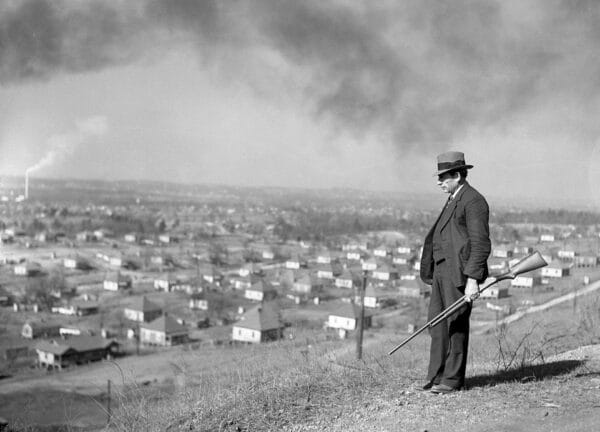 Guard at a Coal Mining Company Town
In 1908, when the Tennessee Coal, Iron, and Railroad Company (TCI), Alabama’s leading coal mine employer, reduced its work force and ordered miners to take a 10-percent pay cut, the UMW called for a strike that soon swept across the state’s coal fields, affecting an estimated 18,000 workers. The governor was asked to take action to keep order in an increasingly volatile situation, and he sent the Alabama National Guard into the coal fields. Comer claimed to be neutral in the strike, but his actions proved otherwise. Guardsmen were soon escorting trainloads of strikebreakers brought into the state by the companies, and desperate striking workers responded with violence. Dynamite explosions were set off, and one black worker, accused of being a dynamiter, was lynched by company men. Comer hurried to Birmingham to be near the center of the crisis. Using health regulations as a pretense, Comer ordered guardsmen to cut down tents erected just outside company property by workers who, displaced from company housing, had no other place to live. With Comer’s help, the strike was broken, and TCI emerged from the struggle with even greater control over its workers.
Guard at a Coal Mining Company Town
In 1908, when the Tennessee Coal, Iron, and Railroad Company (TCI), Alabama’s leading coal mine employer, reduced its work force and ordered miners to take a 10-percent pay cut, the UMW called for a strike that soon swept across the state’s coal fields, affecting an estimated 18,000 workers. The governor was asked to take action to keep order in an increasingly volatile situation, and he sent the Alabama National Guard into the coal fields. Comer claimed to be neutral in the strike, but his actions proved otherwise. Guardsmen were soon escorting trainloads of strikebreakers brought into the state by the companies, and desperate striking workers responded with violence. Dynamite explosions were set off, and one black worker, accused of being a dynamiter, was lynched by company men. Comer hurried to Birmingham to be near the center of the crisis. Using health regulations as a pretense, Comer ordered guardsmen to cut down tents erected just outside company property by workers who, displaced from company housing, had no other place to live. With Comer’s help, the strike was broken, and TCI emerged from the struggle with even greater control over its workers.
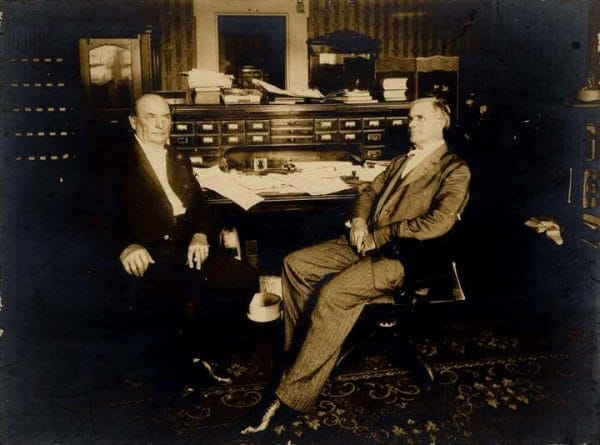 Braxton B. Comer and John H. Bankhead
Prohibited by the 1901 constitution from succeeding himself in 1910, Comer ran for reelection in 1914 and was defeated by an unlikely coalition of railroads, organized labor, and supporters of local option. He did not run for public office again, but in 1920, when Senator John Hollis Bankhead died in office in March, Governor Thomas E. Kilby appointed Comer to serve out the senator’s term until November 2, 1920. Comer then returned to Alabama to manage his textile mills, where he initiated reforms in the treatment of the workers in his company-owned towns. Comer died in Birmingham on August 15, 1927. He was interred at Elmwood Cemetery in Birmingham and was survived by his wife and seven of his eight children. His son Donald Comer became president of Avondale Mills upon his father’s death.
Braxton B. Comer and John H. Bankhead
Prohibited by the 1901 constitution from succeeding himself in 1910, Comer ran for reelection in 1914 and was defeated by an unlikely coalition of railroads, organized labor, and supporters of local option. He did not run for public office again, but in 1920, when Senator John Hollis Bankhead died in office in March, Governor Thomas E. Kilby appointed Comer to serve out the senator’s term until November 2, 1920. Comer then returned to Alabama to manage his textile mills, where he initiated reforms in the treatment of the workers in his company-owned towns. Comer died in Birmingham on August 15, 1927. He was interred at Elmwood Cemetery in Birmingham and was survived by his wife and seven of his eight children. His son Donald Comer became president of Avondale Mills upon his father’s death.
Comer’s administration as governor had a profound impact on Alabama. He used his powers to aid both the general public and business interests. His successful anti-railroad campaign protected industry—especially cotton mills—from paying excessive rates, and control of the rates also protected consumers. His administration made great strides in education, public health, road building, and conservation of the state’s resources. On the other hand, Comer’s attempt to bring Prohibition to the state failed, and his lukewarm approach to child labor was not laudable. He discussed reform of the convict-leasing system but ended up simply trying to find ways to make the system bring more revenue to the state. His actions in the coal strike of 1908 demonstrated that his view of labor had changed little from his plantation days. Comer was a progressive, but a conservative one.
Note: This entry was adapted with permission from Alabama Governors: A Political History of the State, edited by Samuel L. Webb and Margaret Armbrester (Tuscaloosa: University of Alabama Press, 2001).
Further Reading
- Comer, B. B. Papers. Southern Historical Collection, University of North Carolina at Chapel Hill, 1967.
- Hackney, Sheldon. Populism to Progressivism in Alabama. Princeton, N.J.: Princeton University Press, 1969.
